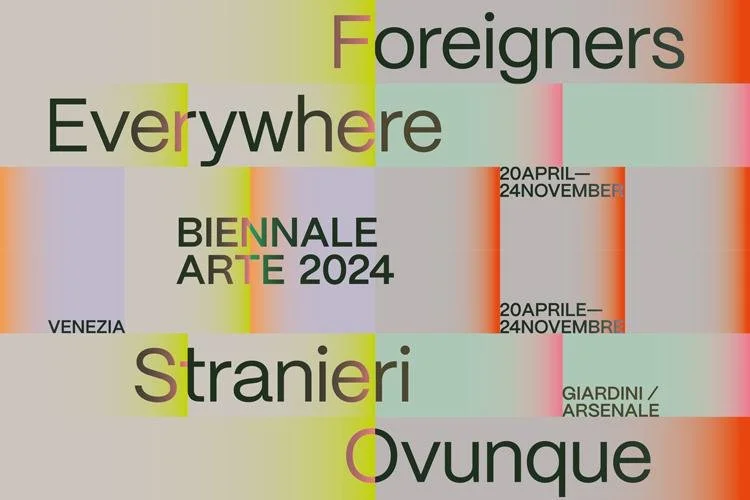Letter from the curator: #1—Art and Postcolonialism
Dear readers,
When we talk about contemporary art today, we hear a lot about sustainability, diaspora, artificial intelligence, the international order… but there’s one theme that keeps coming back, quietly but powerfully: postcolonialism. Even as conversations shift and new buzzwords appear, artists around the world continue to ask: how do we move beyond Eurocentric ways of seeing and telling?
Official Poster of the 2024 Venice Biennale, Foreigners Everywhere
We’ve seen the art world’s responses to this question play out across big events in recent years:
At the 60th Venice Biennale (Foreigners Everywhere, Venice, Italy, 2024), curator Adriano Pedrosa—the first Latin American to lead the Biennale—focused on the Global South and highlighted art histories from others across the world;
At documenta fifteen (Kassel, Germany, 2022), the Indonesian collective ruangrupa explores identity on their own terms, drawing from local cultural heritage;
And at the 2018 Busan Biennale (Divided We Stand, South Korea), the exhibition turned to colonialism, war, and diaspora, reflecting on the deep wounds left by Western imperialism.
But you might wonder: why are we still talking about postcolonialism? Isn’t that an old conversation by now? I think the answer lies in the word itself: colonialism.
In the 19th century, European empires expanded through violence and exploitation, taking over huge parts of Africa, Asia, and South America under the name of imperial rule. After World War II, many colonies gained independence, and on the surface, it seemed like imperialism was over. With political independence came new waves of critique—especially in the late 20th century—trying to break down the structures colonialism had left behind.
Then came the internet and globalization, giving the impression of a connected “global village” where everyone supposedly had equal opportunities. Nobel Prize winners from Latin America, astronauts from Asia, UN leaders from Africa—on the surface, it looked like formerly colonized countries were finally taking their place in the world.
An exhibition at the Singapore National Museum (photo courtesy of the author)
But have we really decolonized? It depends on what we mean by colonialism. A lot of postcolonial critiques from the 1980s and ’90s came out of Western universities, and many of them focused on reflecting on the past rather than creating real political, economic, or cultural change today.
As the Indian philosopher Aijaz Ahmad pointed out, “post-colonialism is more concerned with past colonialism than with today’s imperialism” [1]. In other words, sometimes postcolonialism can miss the power struggles happening right now.
For many artists today, this global capitalist system feels like a new colonial regime—still pushing people to the margins, still silencing certain stories. Their work doesn’t just look back at past injustices. It asks: how do we push back against the power structures of today? How do we imagine different futures?
Theorist Robert J. C. Young puts it powerfully:
“Do you feel like your people or homeland are always pushed to the margins? That when you say ‘I,’ the ‘I’ doesn’t truly refer to you? Have you ever felt like you’re not the subject of your own sentence? That someone else speaks for you—or worse, that when others speak, you’re reduced to an object in their story? That they make no effort to see things from your perspective? That you’re living in a world made for others, not for you? [2]”
These aren’t abstract questions—they hit close to home for many of us. Most of us, in some part of our identity, know what it feels like to be pushed to the edges, to be left out of the dominant story. That’s why postcolonialism isn’t just an academic concept or a debate about the past—it’s a tool for making sense of the world we live in now.
"Only by consuming you can I survive"
Video still, The Last Night, Ji Hye Yeom, 2024, Single-channel video, color, sound (stereo). (photo courtesy of the author)
In the next issues of the AVE newsletter, I’ll be introducing you to artists from Asia and the diaspora working with postcolonial ideas. These artists are pushing back against labels like “orientalism,” breaking free from imposed frames, and carving out spaces where their voices can be heard on their own terms. Their work invites us to rethink what imperialism looks like today—and to reflect on the “colonial situations” we’re still living through in our own lives. I hope their voices inspire and empower you.
Warmly,
Jeongwon Seo
Curator at the Busan Museum of Art
Jeongwon is interested in examining how capitalism shapes perception through propaganda, drawing on her studies in Business and Art Mediation.
[1] Aijaz Ahmad, In Theory: Classes, Nations, Literatures (London: Verso, 1992)
[2] Robert J. C. Young, Postcolonialism: A Very Short Introduction (Oxford: Oxford University Press, 2003)




